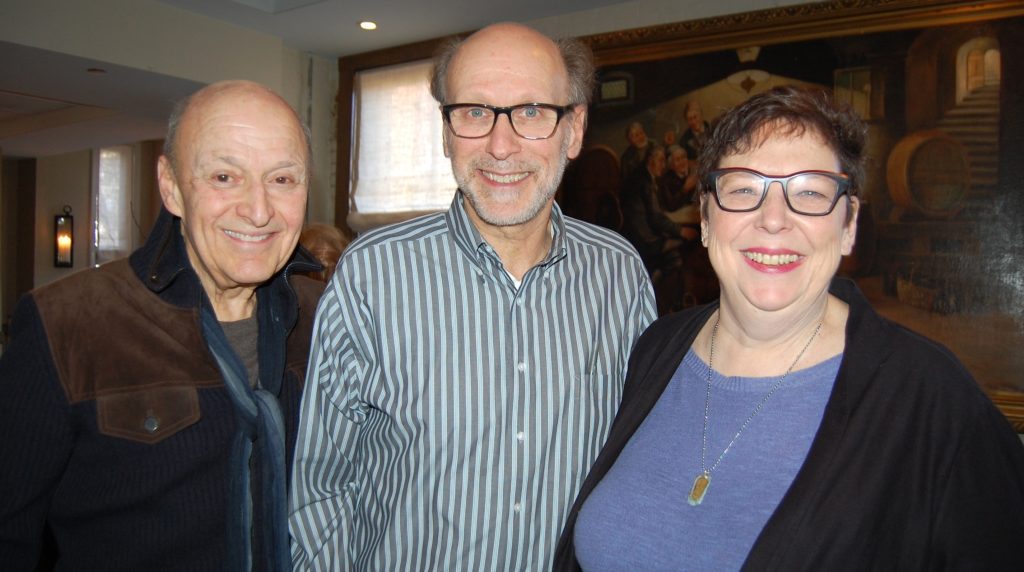Breakfast With Woolly Mammoth’s Howard Shalwitz
By • December 7, 2017 0 940

If it hadn’t been for Georgetown, there might not have been a Woolly Mammoth Theatre Company. That was one of many things attendees learned from Howard Shalwitz, cofounder and artistic director of the innovative company, at Georgetown Media Group’s Dec. 7 Cultural Leadership Breakfast at the George Town Club.
Though Shalwitz and Roger Brady came up with Woolly Mammoth’s unusual name during a night of drinking in New York, they continued to plot its launch in 1980 over “cheap drinks” at Au Pied de Cochon, a Georgetown landmark of sorts that closed in 2004.
The first productions were in the Church of the Epiphany parish house on G Street NW, home to a number of fledgling arts groups. Woolly Mammoth later took over Studio Theatre’s lease at Church and 14th Streets NW and, after a few other stops, moved into its permanent Penn Quarter home in 2005.
“That’s sort of a miracle,” said Shalwitz, referring to the unlikely chain of events that led to Woolly being chosen to occupy the cultural niche in a public-private development. The company now owns its theater on D Street NW.
The winner of dozens of Helen Hayes Awards, Woolly specializes in provocative, often new work. “We always wanted to be one step ahead of the audience, but not two,” he said. Instead of having people lean back comfortably in their seats, Shalwitz has sought to have them “lean forward,” challenging them aesthetically, politically and morally.
Unlike most Washington theater groups, Woolly has built a company of regulars, making “a commitment to some great actors and directors and designers,” he said, pointing out that theatergoers may buy tickets to an unfamiliar work because they know the actors.
Because colleagues have handled the management side, Shalwitz said he has been able to think five years ahead, coming up with and articulating new directions over the years. “There is no standing still in anything in life,” he remarked. But Woolly has tried to avoid becoming more mainstream. “It’s almost like a process of trying to hold onto or steer back to those founding principles.”
Among the last of the generation that founded theater companies in D.C. in the late 1970s and 1980s — including Studio’s Joy Zinoman, GALA Hispanic Theatre’s Hugo and Rebecca Medrano and the Shakespeare Theatre Company’s Michael Kahn, who will retire in 2019 — Shalwitz announced last June that he would retire at the end of the 2017-18 season, 40 years since he and Brady wrote Woolly’s “founding manifesto.”
What does he think of the current state of the theater scene? D.C. can now boast national leaders in almost every category, he said. But companies have to deal with decreased levels of government support and arts education in public schools, along with increased competition for people’s time and money. “The hard question is: Are we overbuilt?”
Half-jokingly, he added: “I don’t mean to be too pessimistic, but I’m getting out at the right time.”
Shalwitz said that his post-Woolly plans are to direct and possibly act (not having acted in eight years, he recently appeared in “The Arsonists”), to teach (he plugged a two-and-a-half-hour course called “Ten Words for Actors and Directors”), to write and to advocate for the arts.
Asked how to measure the impact of theater on society, he referenced a 2009 speech to Harvard theater graduates by playwright Ellen McLaughlin, in which she linked Greek theater to democratic discourse. Though shows can represent multiple points of view, not just preach to the choir, Shalwitz commented that it is “hard to get people on the right side of the political spectrum in our theaters.”
Also, while theater’s social impact — including stimulating economic development in several D.C. neighborhoods — is important, some in the field have pushed to emphasize its “intrinsic impact,” meaning its qualitative effects on individual theatergoers, he said.
The Cultural Leadership Breakfast Series will resume in March.

